Data Integration Cloud Service
Data Integration Cloud Service (DICS) is a cutting-edge solution designed to streamline and simplify the process of integrating diverse data sources across cloud and on-premises environments. By offering a seamless and scalable platform, DICS empowers businesses to efficiently manage and analyze their data, driving informed decision-making and enhancing operational efficiency. With its user-friendly interface and robust capabilities, DICS is transforming the way organizations handle data integration challenges.
Understanding Data Integration Cloud Service (DICS)
Data Integration Cloud Service (DICS) is a powerful solution designed to streamline the process of integrating data from various sources into a unified platform. This service enables organizations to efficiently handle data from disparate systems, ensuring seamless communication and data flow across different applications. By leveraging cloud technology, DICS offers scalability, flexibility, and cost-effectiveness, making it an ideal choice for businesses looking to enhance their data management capabilities.
- Automated data synchronization between multiple sources
- Real-time data processing and transformation
- Secure data transfer with encryption protocols
- Scalable infrastructure to accommodate growing data needs
- User-friendly interface for easy configuration and monitoring
Implementing DICS allows organizations to focus on deriving insights and value from their data rather than dealing with the complexities of data integration. The service supports a wide range of data formats and sources, ensuring compatibility with existing systems. With its robust features and capabilities, DICS empowers businesses to make data-driven decisions, improve operational efficiency, and gain a competitive edge in the market.
Key Features and Capabilities of DICS

Data Integration Cloud Service (DICS) offers a comprehensive suite of features designed to streamline and enhance data integration processes. Among its core capabilities is the ability to seamlessly connect disparate data sources, ensuring real-time synchronization and data consistency across platforms. The service supports a wide range of data formats and protocols, facilitating smooth data transfer and transformation. With its scalable architecture, DICS can efficiently handle large volumes of data, making it an ideal choice for enterprises of all sizes.
Additionally, DICS provides intuitive tools for setting up integrations, allowing users to create, manage, and monitor data flows with ease. Services like ApiX-Drive complement DICS by offering pre-built connectors and automation tools, further simplifying the integration process. Users can leverage these tools to automate repetitive tasks, reducing manual intervention and minimizing errors. The platform also includes robust security features, ensuring data integrity and compliance with industry standards. With DICS, organizations can achieve seamless data integration, driving better insights and informed decision-making.
Benefits of Using DICS for Data Integration

Data Integration Cloud Service (DICS) offers a streamlined approach to managing and integrating data across various platforms. It provides organizations with a unified solution to handle data from multiple sources, ensuring seamless connectivity and data consistency. This cloud-based service is designed to enhance operational efficiency and reduce the complexities associated with traditional data integration methods.
- Scalability: DICS allows organizations to scale their data integration processes effortlessly, accommodating growing data volumes without significant infrastructure changes.
- Cost-effectiveness: By leveraging cloud resources, DICS reduces the need for expensive on-premises hardware, lowering overall operational costs.
- Real-time Integration: DICS supports real-time data processing, enabling businesses to make timely decisions based on the most current data available.
- Enhanced Security: With robust security measures, DICS ensures that sensitive data is protected during integration and transfer processes.
- Improved Collaboration: DICS facilitates better collaboration among teams by providing a centralized platform for data access and management.
In conclusion, adopting DICS for data integration empowers businesses to optimize their data workflows, improve data accuracy, and gain valuable insights. Its cloud-based nature not only supports future growth but also aligns with modern digital transformation strategies, making it an essential tool for any data-driven organization.
DICS Use Cases and Examples

Data Integration Cloud Service (DICS) is a powerful tool that facilitates seamless data management across various platforms. It enables businesses to efficiently integrate, transform, and synchronize data, ensuring that information is accessible and up-to-date. By leveraging DICS, organizations can improve decision-making processes and enhance operational efficiency.
One of the primary use cases for DICS is in the realm of e-commerce, where businesses need to integrate data from multiple sources such as customer databases, inventory systems, and sales platforms. This integration ensures that all departments have access to consistent and accurate information, reducing errors and improving customer satisfaction.
- Real-time data synchronization between on-premise and cloud applications
- Automated data transformation for analytics and reporting
- Seamless integration of IoT data for smart operations
- Streamlined data migration during system upgrades
Additionally, DICS is invaluable for companies undergoing digital transformation. It allows them to modernize legacy systems by integrating them with new technologies, ensuring a smooth transition and continuity of operations. With its robust capabilities, DICS is an essential component for any organization looking to leverage data as a strategic asset.
Getting Started with DICS
Embarking on your journey with Data Integration Cloud Service (DICS) is a seamless experience designed to simplify your data management processes. To get started, first create an account on the platform, ensuring you have access to all necessary credentials and permissions. Once logged in, explore the intuitive dashboard that provides a comprehensive overview of your data sources and integration options. Familiarize yourself with the user-friendly interface, which is crafted to facilitate easy navigation and efficient data handling.
Next, initiate the integration process by selecting the data sources you wish to connect. DICS supports a wide range of applications and databases, ensuring flexibility and compatibility. If you're looking for a streamlined way to automate these connections, consider utilizing ApiX-Drive, a service that simplifies integration setups with its robust automation tools. This can significantly reduce the time and effort required to sync your data. With ApiX-Drive, you can automate repetitive tasks, allowing you to focus on analyzing and leveraging your integrated data for strategic insights. As you progress, make use of the extensive support resources and community forums available to enhance your understanding and maximize the potential of DICS.
FAQ
What is a Data Integration Cloud Service?
How does Data Integration benefit businesses?
What are the common features of Data Integration Cloud Services?
How can I automate data integration processes?
What challenges might I face when using Data Integration Cloud Services?
Apix-Drive is a universal tool that will quickly streamline any workflow, freeing you from routine and possible financial losses. Try ApiX-Drive in action and see how useful it is for you personally. In the meantime, when you are setting up connections between systems, think about where you are investing your free time, because now you will have much more of it.

